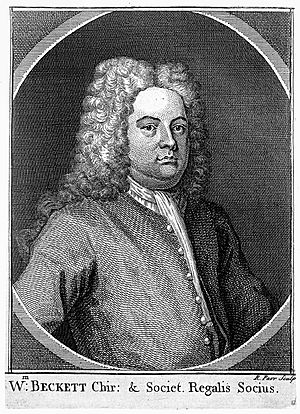William Becket facts for kids
Quick facts for kids
William Becket
|
|
|---|---|
 |
|
| Born | 1684 |
| Died | 1738 |
| Nationality | British |
William Becket (1684–1738) was an English surgeon and antiquary. A surgeon is a doctor who performs operations. An antiquary is someone who studies old things like ancient objects, books, or buildings.
About William Becket
His Life and Work
William Becket was born in 1684 in Abingdon, England. In the early 1700s, he became a well-known surgeon in London. He was also very interested in history and old things.
In 1718, William Becket became a Fellow of the Royal Society. This is a group of important scientists and thinkers. He shared his research there, including papers about old diseases. He also wrote about other topics.
Becket was one of the first members of the Society of Antiquaries. This group started in 1717. Its members studied history and old objects. He was friends with other famous antiquaries like William Stukeley.
For many years, William Becket worked as a surgeon at St. Thomas's Hospital, Southwark. This was a well-known hospital in London. Before 1736, he moved back to his hometown of Abingdon. He passed away there on November 25, 1738.
What He Wrote
William Becket wrote several books about medicine and history. Here are some of his important works:
- New Discoveries relating to the Cure of Cancers (1711 and 1712): This book shared new ideas about treating a serious illness called cancer.
- An Enquiry into the Antiquity and Efficacy of Touching for the King's Evil, with a Collection of Records (1722): This book looked into an old belief. People thought that a king's touch could cure a disease called "the King's Evil." Becket studied old records about this practice.
- Practical Surgery, illustrated and improved, with remarks on the most remarkable Cases, Cures, and Discussions in St. Thomas's Hospital (1740): This book was published after he died. It shared his experiences and interesting cases from his time as a surgeon at St. Thomas's Hospital.
- A Collection of Chirurgical Tracts (1740): This was another collection of his writings on surgery, also published after his death.
 | Kyle Baker |
 | Joseph Yoakum |
 | Laura Wheeler Waring |
 | Henry Ossawa Tanner |

